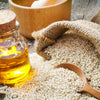3 ways this tasty melon can benefit your health

With its sweet flavor, fruity aroma, vibrant peach color and luscious, melt-in-your-mouth consistency, a slice of ripe cantaloupe presents a true feast for the senses. Like its cousins, watermelon and pumpkin, cantaloupe is a member of the super-healthy Curcurbitaceae family - and carries many of the same health benefits.
Although cantaloupe is scientifically known as Cucumis melo reticulatus, you will most often hear it referred to by its common names. In fact, you can take your pick of nicknames -- cantaloupes are variously referred to as muskmelons, “mush-melons,” rock melons and Persian melons. By any name, though, cantaloupes are nutritional “good guys” that can help support healthy heart function and vision. Let’s look at some of the science-backed benefits of this versatile fruit.
“Sunscreen for the eyes” - cantaloupe compounds protect the retina
Age-related macular degeneration (AMD) - a thinning of the light-sensing macula in the retina at the back of the eye - currently affects 11 million Americans. The National Eye Institute reports that lutein and zeaxanthin, a pair of orange-yellow carotenoids (natural plant pigments) found in cantaloupe, may help to protect against AMD by filtering and absorbing ultraviolet light and “blue” light from laptops and TVs.
In fact, some natural health experts refer to lutein and zeaxanthin as “sunscreen for the eyes.” So, it’s no surprise that these dietary carotenoids are found in the Age-Related Eye Disease Studies (AREDS-2) vitamin supplement advised by many ophthalmologists to prevent AMD. A cup of cut-up cantaloupe contains an impressive 46 mcg of lutein and zeaxanthin - roughly the same amount as in a cup of chopped carrots. The serving also contains close to a third of the recommended daily intake for vitamin A, which is needed for optical health as well.
Cantaloupe supports heart health
Regularly eating cantaloupe can promote a healthy cardiovascular system. A cup of fresh cantaloupe contains 65 mg of vitamin C – a good portion of the 90-mg adult daily requirement advised by the National Institutes of Health. (By the way, a small orange contains only 50 mg of vitamin C). Vitamin C is needed to make collagen, which is indispensable to flexible arteries - and to heart health.
Cantaloupe also promotes a healthy “ticker” with its generous content of potassium (roughly 10 percent of the adult RDA). This essential mineral is vital for maintaining healthy blood pressure. And, a cup of cantaloupe contains a not-too-shabby 1.6 grams of dietary fiber. Higher-fiber diets have been linked with lower rates of metabolic syndrome, an unhealthy cluster of conditions that can set the stage for heart disease.
But, the cantaloupe’s biggest contribution to heart health may be its folate. Researchers say that this B vitamin can break down homocysteine, the pro-inflammatory amino acid implicated in heart disease. A 2017 review published in the American Journal of Medical Sciences credited folic acid (the synthetic version of folate) with helping to prevent strokes in patients with heart disease. If you’re looking to do your heart a “solid,” it certainly can’t hurt to consume folate-rich, vitamin-packed cantaloupe.
Cantaloupe is an ideal pre-workout snack
Cantaloupe, which contains 90 percent water, is second only to watermelon as a liquid-rich food. While this may not sound like a “plus” at first, the melons’ high percentage of water helps to replenish electrolytes and maintain good hydration – especially important before a workout. With only a reasonable 60 calories a cup, cantaloupe still manages to offer up important nutrients - such as the minerals potassium, calcium, magnesium, iron, copper and zinc. Cantaloupes also contain selenium, a trace mineral important for immune function, along with a third of the RDA for antioxidant vitamin A.
Although cantaloupe is satisfyingly sweet, it is still very low on the glycemic index, and won’t cause harmful after-meal “spikes” in blood sugar. This makes cantaloupe a particularly wise snack choice for people with type 2 diabetes. And, its healthy amounts of fiber means that it may help you feel full longer, and prevent food cravings and binge eating.
Cantaloupe lends itself to zesty recipes
Can we say: Enough with the cantaloupe balls!? Cantaloupe deserves a more creative approach – and so do you! (Not that there’s anything inherently wrong with eating round tidbits of fresh cantaloupe … but there are more interesting methods of serving it than scooping out little orange globes).
For instance, you can create a captivating cantaloupe salsa by combining the fresh melon with papaya, mango, jalapeno peppers, red peppers and chipotle peppers. Layer fresh cantaloupe with yogurt and granola for a refreshing and eye-catching summertime parfait, or wrap cantaloupe chunks with thinly-sliced prosciutto for a sweet and savory appetizer. Or, why not create a chilled cantaloupe soup, jazzed up with freshly grated ginger and lemon zest? You can also roast cantaloupe seeds as you would pumpkin or squash seeds. Use chili powder, cayenne pepper, sea salt – or any of your favorite antioxidant spices. Finally, cantaloupe lends itself well to tropical smoothies with pineapple and papaya.
When preparing cantaloupe, remember to rinse the outer skin well. Cantaloupe will last for up to five days in the refrigerator, and up to three on a countertop.
Colorful, refreshing and nutritious - cantaloupe makes a fabulous addition to your healthy diet.
Sources for this article include:






